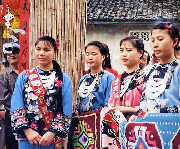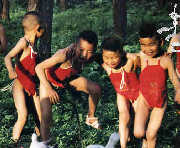Many Chinese ethnic minorities have a tradition of courting through singing. For example, on the Hua'er Party (a song party on the 6th day of the 6th lunar month in northwest China, where young men and women of local minorities meet and court each other by singing Hua'er songs. Hua'er or "Flower" in the songs is the pet name for young woman; while Shaonian or "young man" is for the young man. These addresses for lovers later become the song titles.
At the song fair of the 3rd day of the 3rd lunar month of Zhuang ethnic group inGuangxiZhuang Autonomous Region, there are usually thousands of people meeting and singing love songs, among whom the legendary Sister Liu is the best one. There are many other festivals in China, such as Xinggezuoyue (a song party) of the Dong ethnic group; Ganchang (going to a fair) of the Miao ethnic group, Zuogetang (a song party) of the Yao ethnic group; Shonton Festival and Flower-Picking Festival of the Tibetan ethnic group; and the Axitiaoyue of the Yi ethnic group, Sanyuejie (a song party) of the Bai ethnic group, and Water-splashing Festival of the Dai ethnic group. Though belonging to different customs, these songs all convey the messages of love, attachment and engagement, and have all contributed to the abundant and colorful love ballads of China in general.
Ballads of Daily Life
 |
| "Greeting the Guests" in Hunan |
Folk songs and Ballads all reflect social life to some extent. Ballads of daily life are those ballads that reflect social or household life directly. Some ballads reflect the social inequality such as the lines of "Brickie living in a bothie, weavergirl wearing rags...", "Under the same moonlight over this land, some households are happy while some are in agony" and "Three knives hang over the head of the poor: heavy land rent, high interests, and countless taxes". Some ballads reflect the misery of the working people such as "Misery of Long-Term Hired Hand" and "Misery of the Poor". Some reflect unfair marriages such as "Child Bride", "Boy Husband", "Suffering of a Widow". Some impart knowledge about etiquettes and ways of the world; some are admonitions against smoking, alcohol, gambling, lewdness, and advocates for filial piety. There are also ballads describing local lifestyles and produces, and some funny witty songs. All these ballads have a high folklore value in them and are priceless resources for sociological research.
Historical or Legendary Ballads
People often sing about historic events or figures, ranging from the most remote emperors to influential local figures. Sometimes the ballads are even sung in the form of quiz.
Many regionally or nationally well known legends are handed down in this way, such as "The Story ofMengJiangnu", "The Cowherd and the Weaving Fairy", "White Snake" and "TheButterfly Lovers(Liang Shanbo andZhu Tingtai)". Influential figures in a region or an ethnic community are often portrayed in folk ballads too. Ballads of this kind can be historically based, or word-of-mouth legends.
The length of historical or legendary songs varies: some have three or four lines; some have dozens of lines or hundreds of lines. They are very popular, entertaining and instructive for they contain many criticisms or eulogies to historical figures or events.
Children's Songs and Rhymes
 Every child will live in a world of Children's songs and rhymes after its birth and lullaby may be the most melodious song he/she ever heard. Several months later, the baby is taught to know its own body such as the thumb, forefinger, head, ears, mouth, nose, and then the things around it. When he/she can speak, he/she is taught to count or sing and play with the parents, brothers or sisters, grandparents or playmates until his/her childhood is over.
Every child will live in a world of Children's songs and rhymes after its birth and lullaby may be the most melodious song he/she ever heard. Several months later, the baby is taught to know its own body such as the thumb, forefinger, head, ears, mouth, nose, and then the things around it. When he/she can speak, he/she is taught to count or sing and play with the parents, brothers or sisters, grandparents or playmates until his/her childhood is over.
There are different kinds of Children's songs such as lullabies, object songs, game songs, songs of related word order, dingzhen songs (a trick to begin one sentence with the last word of the previous one) and tongue twisters.
